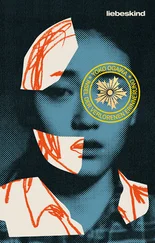Indeed, they were kiwis, just like the ones they sell at the grocery store. But the scene before us was grotesque and dizzying. We moved slowly into the room, which was cluttered with shelves and desks and cardboard boxes. A pencil sharpener, a red ink pad, and a dusty scale sat on the counter. But the rest of the space was filled with kiwis, enormous heaps of them. The air was both sweet and sour. She reached down to pick up a piece of fruit. I watched, afraid she might disturb the pile and bring it tumbling down on us.
The kiwi was perfect, not a bruise or a blemish anywhere.
“Don’t they look delicious?” she said, gazing at the mountain of fruit. “More than you could ever eat!” Then she bit into the one in her hand. I could hear her teeth sink into the flesh.
For a long time, she stood there eating kiwis, one after another. She consumed them like a starving child, dizzy with hunger. Her carefully ironed blouse and her beautiful hands grew sticky. I could only watch and wait until she ate through her sadness.
* * *
When she showed up for school on Monday, she was once more the unremarkable girl I had always known. We never spoke after that day.
Her mother died at the start of winter vacation, and I had not kept my promise to visit her in the hospital.
Rather than continuing on to university, the girl went to a cooking school that specialized in pastry-making. The last time I saw her was at graduation. Some twenty years have passed since our lunch with her father. That Sunday—and the moment in the music room—sank into a hole at the bottom of my sea of memories.
I did phone her once, however, five or six years later, when I came across an obituary for the man we had dined with at the French restaurant. The phone number of the bakery where she was working was in the alumni register.
“I’m afraid I wasn’t much use to you that day,” I said.
“No, you can’t imagine how it helped to have you there. I mean it. I’m truly grateful. At the time I … I…”
She started to cry on the other end of the line. Not because the man was dead. I realized she was finally letting flow the tears she could not cry at the post office, and that this sadness was coming to her peacefully from the distant past.
“I never thanked you properly back then,” she said. “I’m sorry.”
My new apartment was in a building at the top of a hill. From my window, there was a wonderful view of the town spread out like a fan below and the sea beyond. An editor I knew had recommended the place.
The hill was planted with fruit: a few grapevines and some peach and loquat trees. The rest was all kiwis. The orchards belonged to my landlady, Mrs. J, but she was elderly and lived alone, and she apparently left the trees and vines to themselves. There was no sign of laborers working the orchard, and the hill was always quiet. Nevertheless, the trees were covered with beautiful fruit.
The kiwis in particular grew so thick that on moonlit nights when the wind was blowing, the whole hillside would tremble as though covered with a swarm of dark green bats. At times I found myself thinking they might fly away at any moment.
Then one day I realized that all the kiwis had disappeared from one section of the orchard, though I had seen no one picking them. After a few days the branches were again covered with tiny new fruit. Since I was in the habit of writing at night and sleeping until almost noon, it was possible I had simply missed the workers.
The building was three stories tall and U-shaped. In the center was a spacious garden, with a large eucalyptus tree for shade when the sun was too bright. Mrs. J grew tomatoes, carrots, eggplants, green beans, and peppers, which she shared with her favorite tenants, I assumed.
Her apartment was directly across the courtyard from mine. A single curtain hung in her window; the other was missing and she seemed to be in no hurry to replace it. Whenever I looked up from my desk, I would see that orphaned curtain.
From what I could tell, Mrs. J led a quiet, monotonous life. As I was getting up each day, I could see her through the window sitting down in front of her TV, wearily eating her lunch. If she happened to spill something, she would wipe it up with the tablecloth or her sleeve. After lunch, she would pass the time knitting or polishing pots or simply napping on the couch. And by the evening, when I was at last beginning to get down to work, I would see her changing into a worn-out nightgown and crawling into bed.
I wondered how old she was. Well past eighty, I imagined. She was unsteady on her feet and was constantly bumping into chairs or knocking over something on the table. In the garden, however, she was a different woman; she seemed years younger and much more at ease when she was watering or staking the plants, or plucking insects with her tweezers. The clicking of her shears as she harvested her crop echoed pleasantly through the courtyard.
* * *
A stray cat turned out to be the reason for my first gift of vegetables from Mrs. J.
“Nasty thing!” she screamed, brandishing a shovel. I spotted a cat slinking off toward the orchard. It looked nearly as old as Mrs. J and seemed to be suffering from a skin disease.
I opened the window and called out that she should spread pine needles around the beds, but in response she just turned and walked toward me, apparently still quite angry.
“I can’t stand them!” she said. “They dig up the seeds I’ve just planted, leave their smelly mess in the garden, and then have the nerve to make that terrible racket.”
“Pine needles around the beds would keep them away,” I repeated.
“Why do you suppose they insist on coming here and ignore all the other yards? I’m allergic to the hair. It gives me sneezing fits.”
“Cats hate prickly things,” I persisted. “So pine needles—”
“Someone must be feeding them on the sly. If you see anyone leaving food out, would you mind telling them to stop?” As she made this last request, she came marching into my apartment through the kitchen door. Having finished her diatribe against cats, she looked around with poorly disguised curiosity, studying my desk and the cupboard and the glass figurines on the windowsill. “So, you’re a ‘writer,’” she said, as though she found the word difficult to pronounce.
“That’s right.”
“Nothing wrong with writing,” she said. “It’s nice and quiet. A sculptor used to live in this apartment. That was awful. I nearly went deaf from all the pounding.” She tapped on her ear and then went over to the bookcase and began reading out titles as she traced the spines with her finger. Yet she got them all wrong—perhaps she was losing her eyesight, or simply did not know how to read.
Mrs. J was extremely slender. Her face was narrow and her chin long and pointed. She had a flat nose, and her eyes were set widely apart in a way that gave the middle of her face a strange blankness. When she spoke, her bones seemed to grind together with each word, and I feared that her dentures might drop out of her head.
“What did your husband do?” I asked.
“My husband? He was nothing but a lousy drunk. I’ve had to manage for myself, living off the rents from the building, and the money I earn giving massages.” Bored with the bookcase, she next went to my word processor and tapped gingerly at a key or two, as though it were a dangerous object. “He gambled away everything I made and didn’t even have the decency to die properly. He was drunk and went missing down at the beach.”
“I’d love to get a massage when you have time,” I said, eager to change the subject for fear she would go on forever about her husband. “I sit all day and my neck gets terribly stiff.”
Читать дальше












